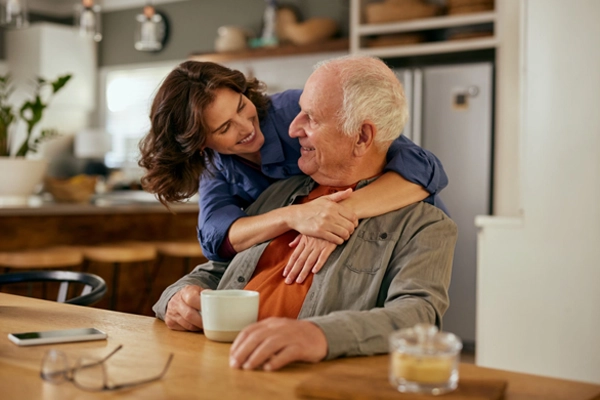Shades of old age
 12 September 2025
/
12 September 2025
/
 6 minutes
of reading
6 minutes
of reading

The old age is referred to as the autumn of life, second youth, or the golden years. This is the final stage of life – it is an inevitable part of life which is going to be experienced by everyone, whose life wasn’t tragically interrupted in their youth.
Shades of old age
„Nothing makes one old so quickly as the ever-present thought that one is growing older” Georg Christoph Liechtenberg
The old age is referred to as the autumn of life, second youth, or the golden years. This is the final stage of life – it is an inevitable part of life which is going to be experienced by everyone, whose life wasn’t tragically interrupted in their youth. It is the time which everyone goes through in a different way – there are as many shades of getting old as the number of people’s life stories.
Growing old is a constant process taking place from one’s birth. Its course depends on genetic factors, one’s living conditions and lifestyle.
Stages of growing old
The World Health Organization divides the process into 3 stages:
- 60–75 years – the young-old years
- 75–90 years – old age
- 90+ years – longevity
Consecutive stages involve progressing physiological and mental senility:
- gradual deterioration of one’s physicality, mentality and independence
- growing constraint of one’s social adapting abilities – so-called social ageing
- increased dependency from others.
How do we perceive the elderly?
The way we perceive the elderly depends on many factors. The young, the middle aged and the old perceive the old age in a different way. The boundaries of the old age are approximate. It often happens that people, who are more than 60 years old, feel young, and are far from regarding themselves as old, so the boundaries of the old age are flexible.
Who is considered to be old irrespective of age? – a person who ceased to be active and lost his or her vitality – the symptoms of growing old are obvious in such a person.
There are many stereotypes about the old age. They influence the way we perceive the elderly people. The “youth cult” which is prevailing in the society often causes the marginalization of the elderly people – this concerns the professional life and the participation in the society. This is opposed to the kind, respectful approach which we owe the old.
The colours of old age
Growing old has its benefits. It is the time when people go through their “second youth”. See what the benefits of the golden years are:
The splendour of old age
The amount of free time available increases with the end of professional career. One can devote it to pursue one’s passions, to rest or travel.
This is the time when grandchildren appear – one can use the amount of free time and the life experience to help raising them.
Many people decide to take up volunteer work to use one’s abilities and time to others’ benefit.
Third Age Universities offer different kind of studies for those seeking knowledge – if one didn’t have the time to study until now, the retirement offers such possibility. One can also take part in many activation programs for people who are 50+, 60+ years old – these are often subsidised by the European Union.
Some people when asked what they fear the most would answer – growing old. What makes some people think this way about growing old?
Drawbacks of growing old
For some people growing old is connected with many ailments which develop with age – to name a few these are urinary incontinence, memory impairment, osteoporosis, rheumatism, obesity, dementia.
Impairment of one’s physical fitness – it leads to becoming dependant on others and brings growing frustration because of the lack of independency.
Many old people think that they are useless and rejected by the society. Often this is accompanied by loneliness – one’s partner or friends who are the same age pass away, children live their own life.
Deterioration of the quality of life – the pensions are lower than the salary for the full-time job one used to have.
Older people become scared of death; they experience sorrow due to the fact that their life is coming to an end. Thought about the wasted opportunities and unfulfilled dreams make one depressed.
Loved one’s old age – how to help?
We usually come across the old age in our family members. We don’t always know what to say, how to treat that person, and how to help in order not to hurt that person’s feelings.
 A few helpful tips
A few helpful tips
- Do not impose your help – remember that an old person is not a big child, and has the right to decide about his or her life. That includes the right to accept or reject your help.
- The elderly need a purpose in life – an activity that will fill their free time, engage their mind and give them something to do. What is best for such a person depends on their health, physical condition and needs.
- The elderly deserve respect and consideration for their dignity – being around ill people is a particularly delicate subject matter – they are made to resign from their independence and have to rely on the caregiver.
- Suggest your loved one taking exercise – these carried out on a regular basis will improve their mood and help them keep fit.
- If your loved one is ill – provide medical and nursing care, and ensure that person’s comfort.
- If your loved one requires care, but you can’t provide it, make use of the help of professional medical caregivers or voluntary workers.
- The problem of urinary incontinence appears or becomes intensified in older people. It is often the case that an elderly person finds it difficult to accept that fact, and they reject the idea that this problem concerns them. There are many ways to convince that person about the usefulness of absorbent products – talk with your loved one, show him or her some informational materials. The key words are discretion, comfort and unpleasant smell prevention. Learn about the Seni absorbent product range here.



 Homepage
Homepage
